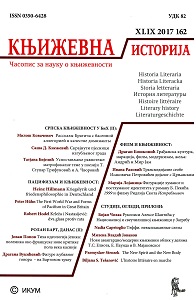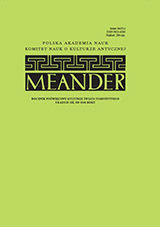
Antyczna tracycja epicka w Hobbicie J. R. R. Tolkiena
The Odyssey, the Iliad and the Argonautica of Apollonius of Rhodes are among the possible sources of motifs present in the Hobbit.
More...We kindly inform you that, as long as the subject affiliation of our 300.000+ articles is in progress, you might get unsufficient or no results on your third level or second level search. In this case, please broaden your search criteria.

The Odyssey, the Iliad and the Argonautica of Apollonius of Rhodes are among the possible sources of motifs present in the Hobbit.
More...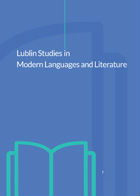
In this paper, we study, in a comparative approach, the notion of dialogism and the manner of its insertion in the text of Sahar Khalifé, Ghada El-Samman, Annie Ernaux and Hélène Cixous. The analysis of stylistic Arab and French works reveals how dialogism enters the textual space, through language use, language that is constantly plagued otherness. Thereby manifests a spring of writing that brings the dialogue with others to build a "story", a scriptural language activity and operating in the manner of "grafting" of co-locating the text in a between.
More...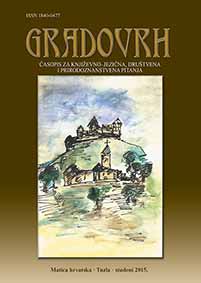
Since the Middle Ages there has always been a continuous interest in the Jewish tribe in English literature. Apart from William Shakespeare, other great writers such as Geoffrey Chaucer, Christopher Marlowe, CharlesDickens, George Eliot, and James Joyce have all created Jewish characters with varying degrees of prejudice. Yet for more than four centuries, Shakespeare’s The Merchant of Venice with its compellingly effective representation of its title Jew, Shylock, has remained the most controversial one among all the works dealing with the Christian-Jewish antagonism. A sa result the question of anti-Semitism has always been the popular concern for critics ever since. This will also be the very problem to which this paper intends to give a plausible answer. For centuries, The Merchant of Venice has delighted and confounded its readers. Pouring himself into the life and deeds of both the Jewish and Christian characters, Shakespeare has provoked various interpretations of his work. To begin with, the uncomplimentary depictions of Jews in The Merchant of Venice have fed the anti-Semitic prejudices of writers like T.S. Eliot, D.H. Lawrence, or Ezra Pound. Less controversial critics, however, have sensed in this work paradoxical portrayals of the “imperfect” Christian characters and “villainous” Jews. This discovery may indeed lead us to meditate upon the real intentions of William Shakespeare.
More...
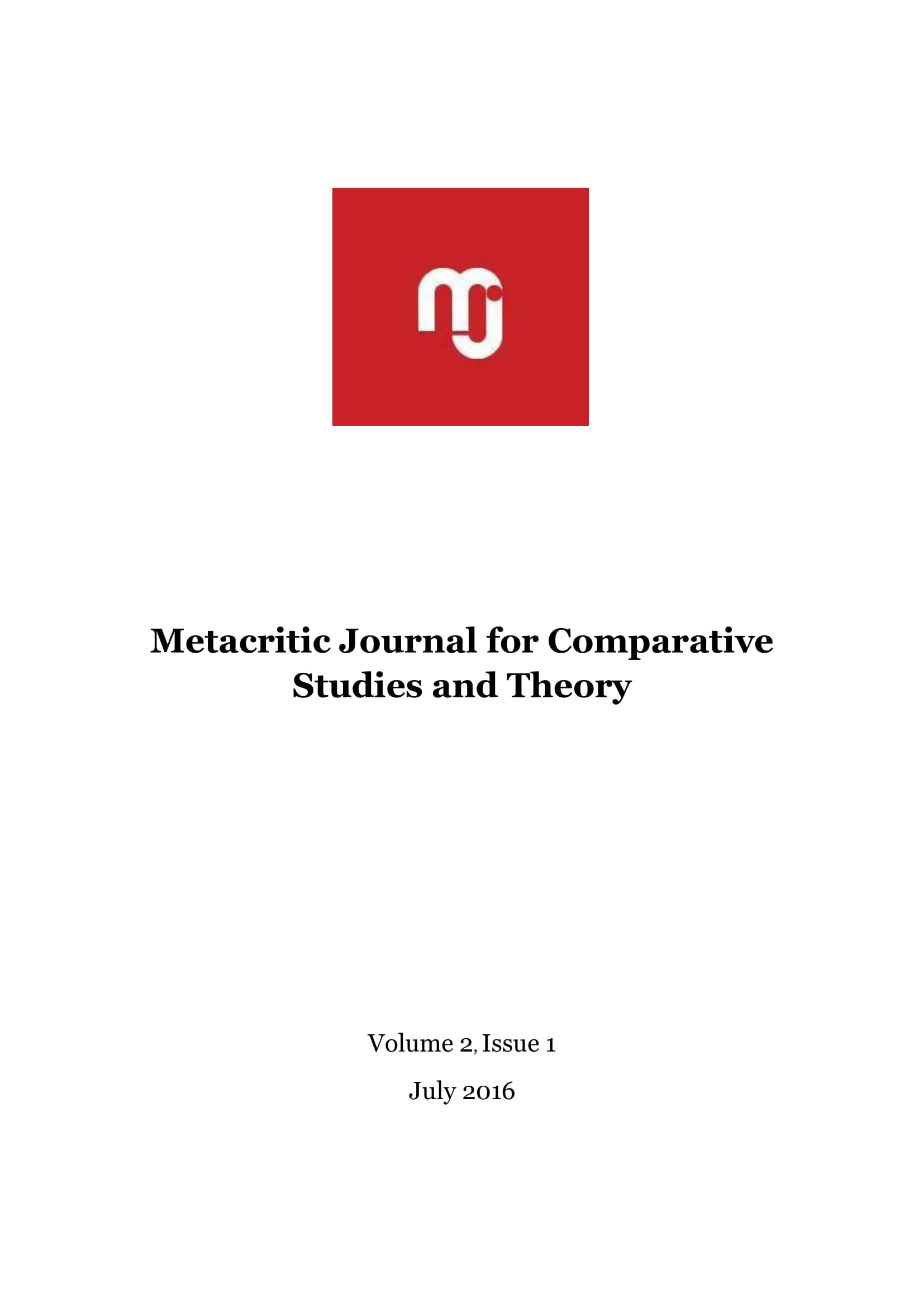
Our study investigates the possible ways of discussing the functions of the identity in fictional work. As point of departure we have chosen the novel Jacob se hotărăște să iubească (Jacob beschließt zu lieben, C.H. Beck, 2011) by Cătălin Dorian Florescu. Identity is multilayered, having being formed and transformed continuously in relation to the ways we are represented or addressed in the cultural systems, as Stuart Hall (1992, 1997) stressed out. The approach is heavily influenced by postcolonial and postmodern sociological theories of identity, that are referring to identity in the general framework of terms as society,power, self and imagined communities. Identity and space are intertwined, hence they are complex phenomena, that can more adequately be examined from the vantage point of postmodernism.
More...
Over the past 50 years, the understanding of the nymphet has mutated from a special type of becoming, as seen in Nabokov′s master text, to being a Lilith-like essence. There are other rules to be observed by the American artists Alan Moore and Melinda Gebbie when portraying a nymphet as contrasted to those Soumei Hoshino has to follow in Japan. They navigate different (sub)cultural contexts and address varying conventions, so that visually “translating” Lewis Carroll′s Alice becoming a nymphet implies different intercultural negotiations. This paper is a piece of reader-oriented criticism which sets out to explore the visual semiotics at play,especially the meanings conveyed by the particular use of frames, the selection of proxemics, social cues, angles, even of the coloring itself.The two graphic novels to be explored, Moore′s Lost Girls (2006) and Hoshino′s Heart no Kuni no Alice/Alice in the Country of Hearts (2008) present interest as(sub)cultural “translations” within the framework of pop culture. Their framing of ethical concerns differs from that of the so-called “high-brow” literature or of the mainstream throw-away sensationalist writings that proliferate various images of willing nymphets. Naturally, aesthetics also remains to be a concern, given the markedly visual nature of these works, with their meaning and appeal emerging from a combination of image and text. The pressing questions to be addressed are what to show and how to do it, especially how to code her image and “translate” it in the culture of the artist, all while adapting beauty ideals so that the image of the Victorian era girl and the nymphet collide. The last point is especially problematic since, to Nabokov, the nymphet only exists in the eye of the nympholept. He explains the failures of Stanley Kubrick and Adrian Lyne by showing that their films made her conventionally attractive and, thus, obscured the very deviance and particular distorted vision of the nympholept, which amplifies some elements rather than others. Dolores Haze was chosen not for a budding womanly sexuality, but especially for her underdeveloped, tomboyish physique unto which the nympholept could project his desires for a fairytale-like frozen time. The two portrayals of Alice look like ordinary girls removed from the image of the real Alice Liddel, as they are instances of reverse ekphrasis and visual quotation, being reinterpretations of the already classic, further popularized by Disney, image of a blonde girl in a blue maid-like dress.
More...
After 9/11, we have witnessed several backlashes to Francis Fukuyama’s theory regarding the end of the world. With the credibility of this theory questioned,new maps have emerged and the theories regarding cultural dialogue have been updated, providing support for Samuel Huntington’s concept of clash of civilizations. In this context, Western Europe produced new forms of collective anxieties. In the present paper, I am interested in explaining two particular forms of fears that appear in the European Union tandem France-Germany throughout the 2010s. More specifically, I will explain how the notion of collective anxiety is translated from a cultural point of view in two best-seller books: Timur Vernes’ Er ist wieder da and Michel Houellebecq’s Soumission. The first part of this study will be devoted to asking to what extent we may use the notion of collective anxiety. In the second part, we will deal with the French case of Michel Houellebecq’s 2015 novel, where he explores the possibility of having an Islamic president in the near future. Furthermore, we will deal with Timur Vernes’ novel, where he proposes a return of Adolf Hitler in mid-2000s Berlin. The final part contains an attempt to understand the two forms of collective anxiety: the fear of the past (Germany) and the fear of radical otherness (France). Lastly, we will explore the reception of the two books in Germany and France.
More...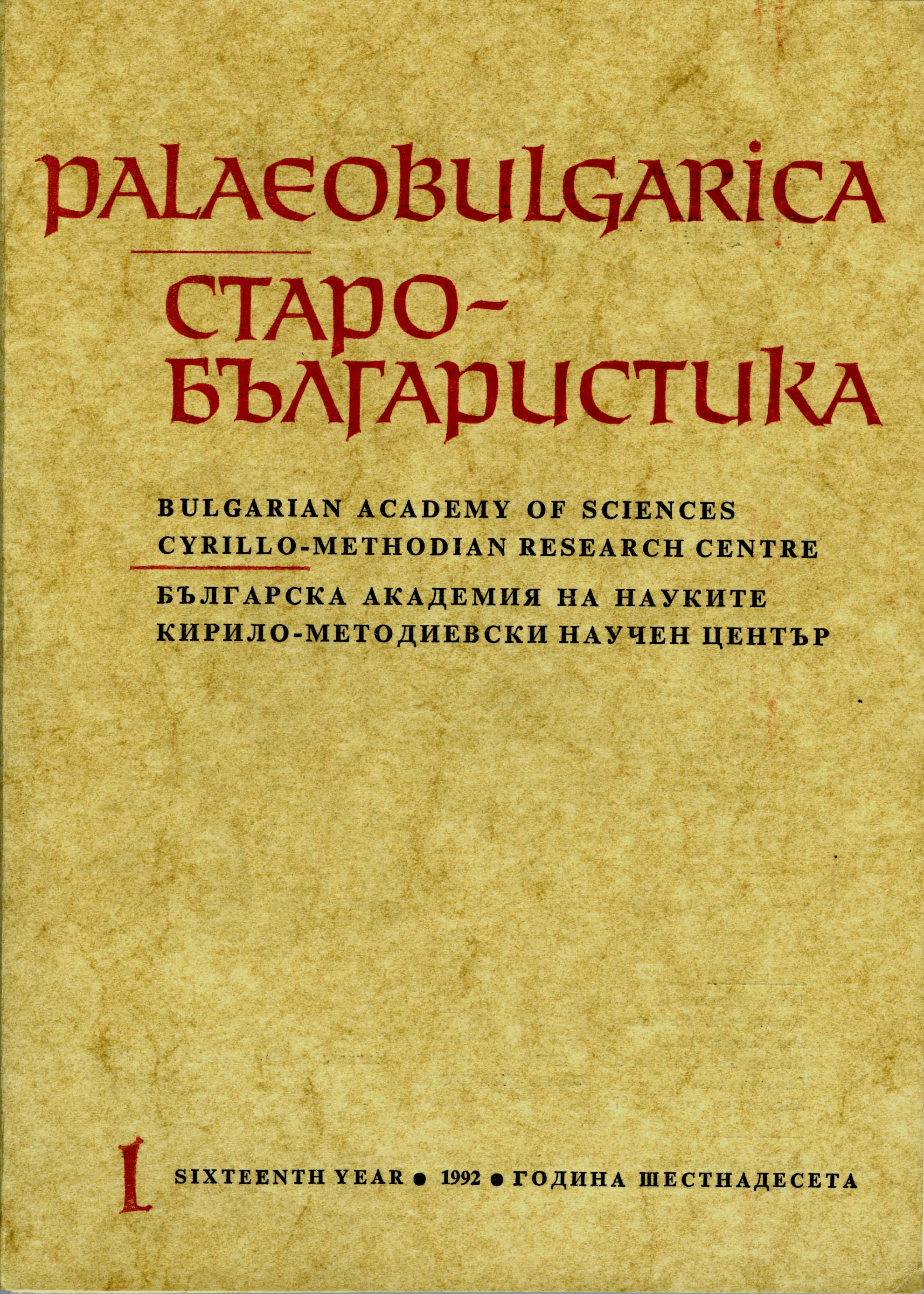
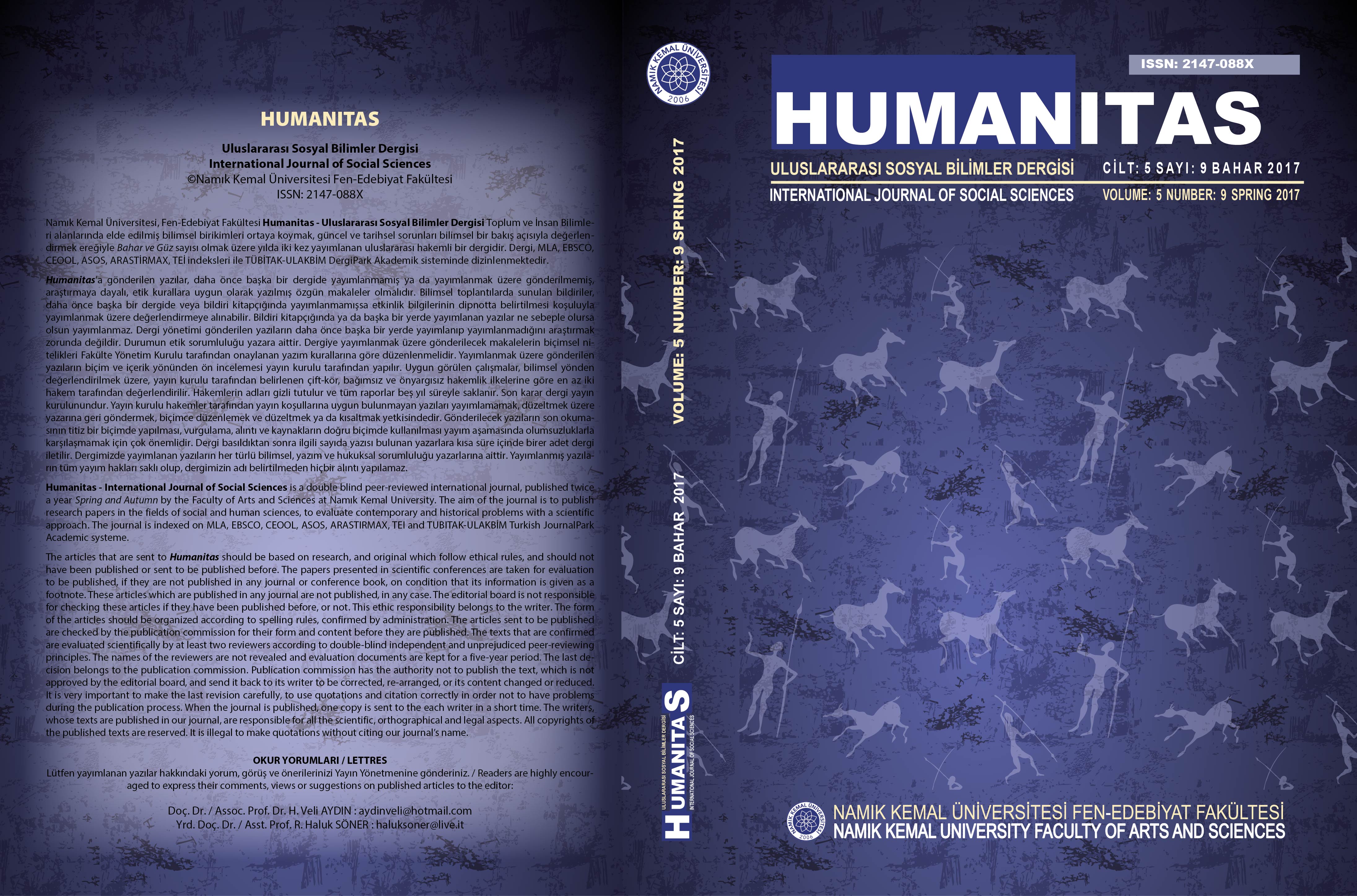
The contemporary fiction reveals a great interest in the representation of fairy tale motifs and structures. Fay Weldon’s novel, The Life and Loves of a She-Devil, attempts topresent the power of resurgence of fairy tale by depicting and revising several of fairy tale motifs and structures. This article focuses on the motif of beauty, as it is one of the central paradigms of most fairy tales, and emphasises that beauty continues to be one of the most stringent preoccupations of individuals living in the contemporary culture of appearances. Not only in fairy tales but in today’s world as well the oppressive beauty norms and the struggle to achieve perfection become a problematical concern for most women.By employing many popular fairy tale motifs like jealousy, desire and craving of the stepsisters (in Cinderella), stepmothers (in Snow White and Rapunzel), rivals (in Little Mermaid), antagonists (like Maleficent in Sleeping Beauty), the novelist tries to question virtue implied in beauty. This study shows that Fay Weldon’s novel depicts the dominant ideology of beauty which is inserted in the fairy tales, questions the excessive interest in beauty and female body in the mainstream culture, divulges the artificiality of such preoccupations,illustrates the abusive and deluding nature and presents their damaging impact upon individual’s identity.
More...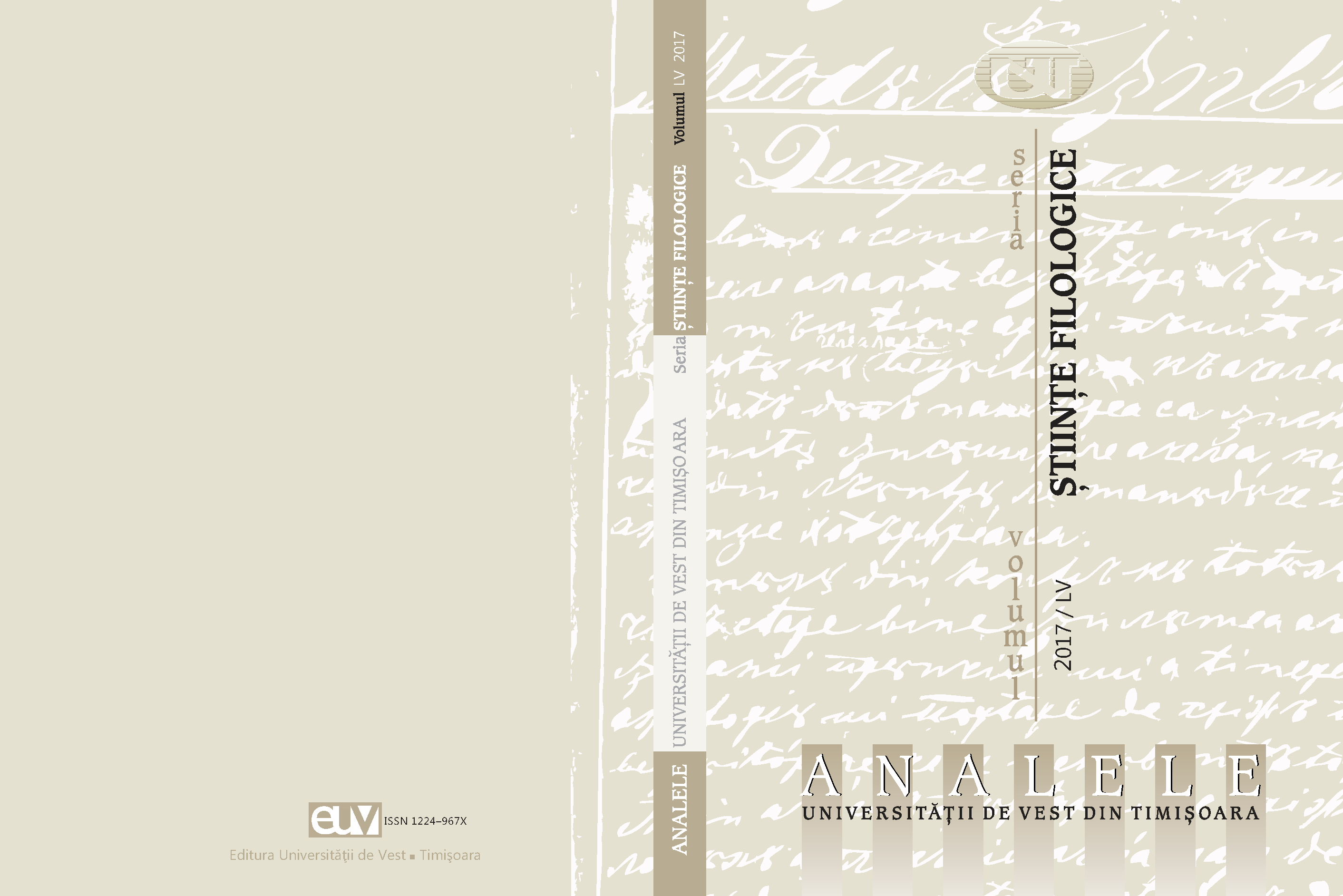
Aron Hector Schmitz/Ettore Schmitz/Italo Svevo, a 46-year-old man from Trieste, met, in 1907, at the Berlitz School in Trieste, a young, 25-year-old English teacher from Dublin, James Joyce. It would become a lifelong friendship, incorporating on many levels (biographical, social, intellectual) a great accumulation of mutual exchanges, culminating with the transformation of the real Svevo into the Joycean character, Bloom. On the other hand, the city of Trieste, as the geographical centre of the liaison between the two writers to be, is of great interest to us. The city (Dublin or Trieste) becomes itself a character in the literary work of both Joyce and Svevo. If Bloom’s roots, as a character, can be traced (even if not entirely) to Italo Svevo, it can also be said that without James Joyce’s constant encouragement, Ettore Schmitz would have never finished his central literary work, The Conscience of Zeno, and thus would have never become the well-known Triestine writer: Italo Svevo. The influences between them can therefore provide a fruitful starting point for a study in the field of comparative literature.
More...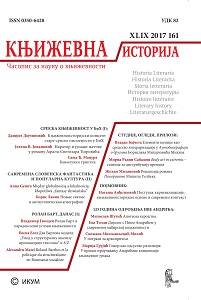
In DeLillo’s prose, especially in the novels preceding Body Artist, the worlds presented, their time and space, rely on fragments and artifacts, objects and events from everyday life, trinkets and details from newspaper clips and radio news bulletins which served as a gauge for the flow of time and for the duration of events –DeLillo constructed sequences of images whirling one after another, densifying time and compacting its spans. In the novel Body Artist, there is a conspicuous absence of this mechanism. In a secluded house, time retreats to its origins, circles in a closed loop, only to be liberated once again when a new system of binary pairs creates anew node compatible with the network from which the old node was extracted. The events are limited to the re-enactment of the basic sensory perceptions and the repetition of the auditory sequences, and as such, they are materialized through the strata of the different media, from a webcam device broadcasting images from a road in a Finnish city of Kotka, to the materialization of a second body, whose origin remains undetermined. This is the body which reproduces the past in a progression of erratic vocalized sequences of time that is forever lost for the protagonist. The body will beara name “Mr. Tattle” and it will be a medium of its own, a lost connection that Lauren,the protagonist, struggles to re-appropriate. She will unite all the strata in her own body and in the performance Body Time, trying to reinstate the time flow and to create a new self-perception of her own identity.
More...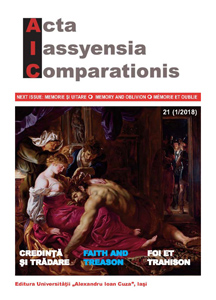
Although frequently present in Romanian folklore (just like in the imaginary of any community) as a broken taboo, so far betrayal has not been intensely researched in this particular context. In Romanian folktales betrayal brings to the fore one’s self-consciousness and one’s chosen way of living one’s own life, as well as the collective perception (i.e., evaluation and sanctioning) of a behaviour that breaks (thus undermining) well-established social and moral norms. Besides its symbolic meaning, an act of betrayaldefinitely has a hermeneutic value too, since it involves destructuring – restructuring of a certain status quo.From the phenomenology of evil in Romanian folktales (the subject of a book I am working at) I selected several aspects – namely: establishing of the truth; the final ordeals; the motif of the treacherous mother/ sister/ wife – which I analyze in the present study, seeking to determine: how and why, at some point, archaic/traditional family relationships cease to be functional because of an act of betrayal; what symbolic functions and significance betrayal has in folktales; how and why the hero’s or another actant’s body bears the consequences (settling the problem) of betrayal acts.
More...
This idiosyncratically titled paper is motivated by an attempt to answer the unexpectedly difficult question about betrayal as a fundamental theme or motif in literature—literature in general, from the first known such work, Gilgamesh, through Greek and Roman mythology, fairy tales and folk tales, medieval romances, Dante, Cervantes and Shakespeare, to Goethe, Tolstoy and Joyce, to Anne Sexton and Philip Levine. Our tentative answers: betrayal may represent the fundamental human conflict, as it undermines two of man’s essential claims to existence—identity and communication; evil is more powerful than good; betrayal is a prominent form of cognitive dissonance; and all of these are “illustrated” in five betrayal poems by William Stafford, Anthony Hecht, Frank O’Hara, Anne Sexton, and Philip Levine.
More...
The relationship between faith and betrayal involves thinking of the way that various forms of language relate to one another: faith seems to associate with a language following the right path, while, on the contrary, betrayal is consistent with a language which strays. We believe that in his Diary of My Time Georges Bernanos is denouncing the Church’s betrayal of faith. In order to do that, he has to blend the denunciation speech and the speech of pure faith, which can be seen as the language of childhood. This article wants to show that Bernanos tends to asymptotically push language towards this ideal idiom: the “original” language of childhood, i.e. the language of pure faith. But such project seems doomed never to be accomplished.
More...
Benito Pérez Galdós; Spanish literature; realism; The Forbidden; betrayal.Benito Pérez Galdós is the most illustrious representative of Spanish realism. In his acceptance speech on his reception into the Royal Spanish Academy, the author says that the novel is an ‘image of life’ and that in all of his work, he forces himself to show the most faithful reflection of the real life. The Forbidden tells the story of José María, a man who falls in love with Eloísa, his married cousin, and, because of this, he betrays her husband’s friendship. He seduces the woman with expensive gifts and makes her accustomed to luxury. The husband dies and the hero is filled with remorse, and he no longer feels attracted to the senseless woman who is able to ruin him. So it is her turn to betray, and she replaces him with an older man. She goes to Paris with her new lover and when she returns, she visits José María to say that it is him whom she loves. However, José María doesn’t love Eloísa anymore, but instead he loves her sister, who is married. José María is always attracted by ‘the forbidden’.
More...
The short story Wash that was a source of inspiration for the novel Absalom, Absalom! is a subtle representation of the class conflict in the Southern slave system. Beyond that, however, Faulkner also alludes to more intense and deeper human realities: humanity in the face of humiliation and destruction. The use of the symbols is indicative in the construction of the short story. The “whip” and the “scythe”, therefore, come to represent the people who choose to wield them, reflecting not only their social classes but also the roles they fulfill in the story. Thus, if at the beginning the class distribution seems to be in keeping with the slave ideology promoted in the Southern plantation romance, with the whip representing the rich class and the scythe the poor farmers, by the end of the story, the utter inhumanity of the planter is exposed and the dream of the aristocracy is torn apart. The scythe, then, becomes the symbol of revenge and rebellion, the weapon of “Death”. The paper will focus on complex the meaning of these symbols in the context of a revenge story with echoes from the Greek tragedy.
More...
The reputation of Judas Iscariot is well established: he denounced Jesus of Nazareth, the Son of God, to the Roman authorities for the derisory sum of thirty deniers. He embodies the traitor that no reason can justify. The literary fortune of this first anti-hero is unprecedented in Western litera-tures. A revolution would have been accomplished by the discovery of an apocryphal gospel attributed to Judas, whose Gnostic testimony would alter the whole perspective of the Christ drama: just as Christ fulfilled the Father’s will, the disciple would have sacrificed his public integrity by fidelity to Christ, his master. The special status occupied by Judas in the pantheon of archetypal characters problematizes the freedom of the characters in the fictional worlds: in history, in litera-ture, in religion. Do these immortalized beings in the collective imagination still have the slightest freedom? As a result, the Gospel of Judas seems to rehabilitate a Judas Herald of Christ, opening literature to the edification of evil.
More...
The present paper deals with the issue of faith and betrayal from the contemporary Spanish intellectuals’ perspective during post Civil War times, a historical period which stands out because of its high degree and scale of unilateral violence. Due to limits of extension, our approach is just a mere outline of the subject, focused on the specific case of one personality of the 20th century Spanish thought and culture: Julián Marías Aguilera (1914-2005), a philosopher whose vast written work, mainly essays, covers a long period of time, almost to the end of his days, and has enjoyed a remarkable dissemination within the boundaries of the Spanish speaking countries. Marías is one of those intellectuals who decided to remain in their homeland and carry on there with their activities, despite the Civil War and their being harassed by the dictatorship that followed. After a brief approach to his life and circumstances through his own written work, the floor will be given to his son, the writer Javier Marías (1951-). Through some of his own writings, Javier Marías broadens the considerations on the faith and betrayal of the intellectuals, with particular regard to his father’s case.
More...
